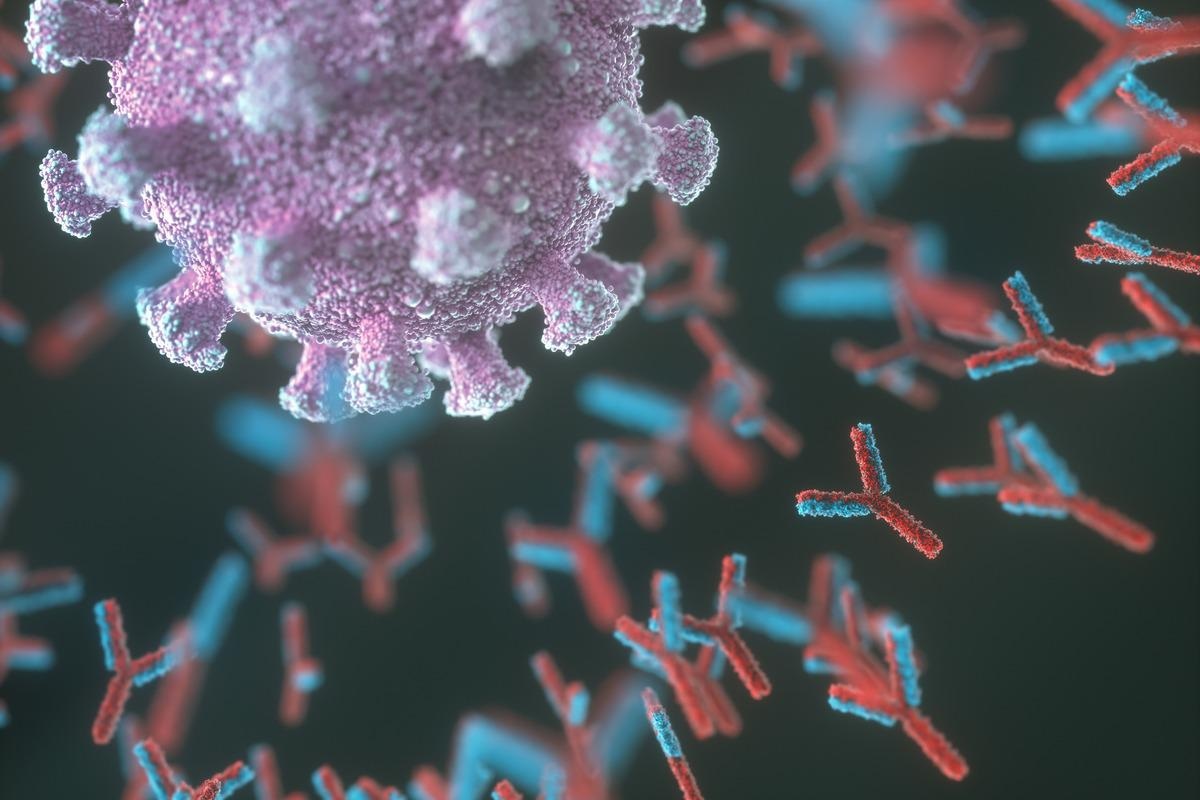They then combined the results with existing deep mutational scanning data to design six antigens that can offer protection against significant immune escape mutations in the SARS-CoV-2 receptor-binding domain (RBD).
 Study: Design of immunogens for eliciting antibody responses that may protect against SARS-CoV-2 variants. Image Credit: ktsdesign/Shutterstock
Study: Design of immunogens for eliciting antibody responses that may protect against SARS-CoV-2 variants. Image Credit: ktsdesign/Shutterstock
The SARS-CoV-2 virus has mutated and evolved into many new variants in the last 2 years since its emergence in late 2019. Currently approved vaccines containing the wild-type (WT) virus show reduced efficacy against many of these variants, especially the most recent Omicron variant. The history of epidemics caused by zoonotic coronaviruses and the emergence of new and more dangerous SARS-CoV-2 variants underscore the need for more efficient vaccines that protect against new strains of evolving viruses.

 This news article was a review of a preliminary scientific report that had not undergone peer-review at the time of publication. Since its initial publication, the scientific report has now been peer reviewed and accepted for publication in a Scientific Journal. Links to the preliminary and peer-reviewed reports are available in the Sources section at the bottom of this article. View Sources
This news article was a review of a preliminary scientific report that had not undergone peer-review at the time of publication. Since its initial publication, the scientific report has now been peer reviewed and accepted for publication in a Scientific Journal. Links to the preliminary and peer-reviewed reports are available in the Sources section at the bottom of this article. View Sources
The study
In the present study, researchers analyzed diverse coronavirus spike sequences and structures and combined the results with deep mutational scanning data to develop SARS-CoV-2 variant antigens comprising of the most important potential mutations.
To identify variable and conserved residues in coronavirus spike proteins, the team leveraged structural as well as sequence data. Structural data helps determine structural conservation independent of the number of deletions or insertions. Each spike residue was assigned a conservation fraction between 0 to 1, the average of the biochemical and structural conservation fractions. Using a certain coronavirus as a reference, the researchers calculated the structural conservation fraction from the structure-based sequence alignment and the biochemical conservation fraction from the multiple sequence alignment.
In order to identify vaccine targets for all coronaviruses, they analyzed the spike protein structures and sequences of 12 coronaviruses that belong to different genera. The authors hypothesized that a cocktail of different SARS-CoV-2 variant spike sequences can elicit a polyclonal response that offers protection against many different variants of SARS-CoV-2. In other words, the objective was to generate a polyclonal response comprising strain-specific antibodies that work together to protect against multiple SARS-CoV-2 variants.
They trained a neural network to foresee RBD expression and angiotensin-converting enzyme 2 (ACE2) binding, allowing the determination of the stability and ACE2 binding of these antigens to confirm they are viable variants. Using the same approach, they trained another network to predict changes in ACE2 binding affinity of the designed antigens. They then used a computational affinity maturation (AM) model to analyze the antibody response to immunization with varying combinations of the developed antigens.
Results
The results showed that the designed antigens were stable and maintained ACE2 binding as per the predictions of the neural network. None of the antigens designed in this study significantly decrease ACE2 binding affinity or expression more than the corresponding circulating variants. As these circulating variants produce viable virions, the authors conclude that after immunization the antigens designed in this study would induce immune responses relevant to the viable viral mutants likely to emerge in the future.
The team observed higher titers for immunization with an antigen cocktail than WT and the titers were dependent on the type of antigens in the cocktail. Also, antibody titers were low against certain variants following WT immunization while they were high following immunizations with a cocktail of designed antigens. Furthermore, titers against different variants changed based on previous exposure to the WT virus and the number of mutations present in the variant.
Using their model, the researchers identified an optimal immunization scheme using the six antigens they designed. They simulated single and double immunization schemes using all six antigens (Seq1-6 and Seq1-6 | Seq1-6), a single immunization using sequences 1-3 (Seq1-3), and immunization with Seq1-3 followed by immunization with sequences 4-6 (Seq1-3 | Seq4-6). The results of their analysis suggested that Seq1-6 | Seq1-6 may be the most effective immunization scheme that could offer protection against currently circulating variants as well as those likely to emerge in the future.
Conclusions
The study results show that immunization with an antigen cocktail will likely promote the evolution of greater titers of antibodies that target all SARS-CoV-2 variants compared to infection or immunization with only the WT virus.
The researchers also performed spike protein conservation analysis in 12 different coronaviruses from various genera and found that the S2’ cleavage site and fusion peptide are potential pan-coronavirus targets of vaccines.
Although the authors support a single vaccination scheme to protect against different coronaviruses, they are hopeful that more research in this area will follow that will validate these findings.

 This news article was a review of a preliminary scientific report that had not undergone peer-review at the time of publication. Since its initial publication, the scientific report has now been peer reviewed and accepted for publication in a Scientific Journal. Links to the preliminary and peer-reviewed reports are available in the Sources section at the bottom of this article. View Sources
This news article was a review of a preliminary scientific report that had not undergone peer-review at the time of publication. Since its initial publication, the scientific report has now been peer reviewed and accepted for publication in a Scientific Journal. Links to the preliminary and peer-reviewed reports are available in the Sources section at the bottom of this article. View Sources